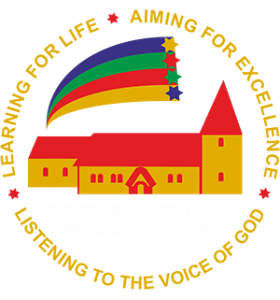Philosophy for Children (P4C)
At South Bersted Church of England School, we are working to become a Philosophy for Children school. P4C is used in schools as a way of creating an inspiring, dynamic and meaningful curriculum as it allows children to learn, practise and develop skilful thinking and questioning.
The P4C programme follows the four C’s of thinking; Caring Thinking, Collaborative Thinking, Creative Thinking and Critical Thinking.
What is P4C?
P4C was developed by Professor Matthew Lipman and its main aim is to encourage young people to be more reasonable – that is, to be ready to reason and be reasoned with, promoting rational thinking in a calm reflective environment.
“The aim of a thinking skills program such as P4C is not to turn children into philosophers or decision-makers, but to help them become more thoughtful, more reflective, more considerate and more reasonable individuals.”Matthew Lipman.
Why use P4C at school?
The skills the children learn through P4C are life skills that have a positive impact across all areas of the curriculum as well as personally and socially. P4C promotes high expectations; children are encouraged to give reasons and explanations for their answers. No answer is wrong, so children have the confidence to share their opinions. Children learn to listen to and be respectful of others’ views; they understand that everyone is allowed their own opinion.
Discussing, listening and responding to a range of thoughts allows children to see that a problem or idea has a range of views and beliefs. This helps them to make sense of their own ideas; either confirming their original thoughts or changing their views based on reasons given by others. P4C promotes the fact that children have the right to speak, be heard and have a viewpoint. An education that emphasises community, communication and independent thinking helps to prepare children for an ever-changing world.
P4C can stimulate some fantastic questioning and thinking and as a result it has an impact on children’s work. Verbal skills developed during P4C sessions, such as discussion, reasoning and explanation can impact positively on a range of curriculum areas
How does it work?
Every Thursday the whole school is presented with a P4C stimulus during Collective Worship. It will be discussed as a school and ideas will begin to be generated. Children will then return to their class. Once in class, the children usually start off with a warm up, working on a particular skill, then they will look at the stimulus again as a class. Enquiry stimuli can be anything from videos and books to artefacts, music or art. Anything that is concept rich and will get the children thinking! Then, depending on the age of the children, they will discuss and share their thoughts, ask questions, and formulate their own philosophical questions. If they have come up with their own questions, the children vote for the one they’d most like to discuss for their enquiry. Enquiries are child led and the teacher acts as the facilitator, guiding the children through their thinking, without influencing ideas or opinions.
Within Early Years and Key Stage 1 this works slightly differently, with philosophical style questions being discussed with children in an informal manner: this will include questions such as: ‘Do all Superheroes wear capes?’ and ‘Would you prefer to be a cat or a dog? Why?’ This style of questioning allows children to become familiar with explaining their ideas and developing an opinion.
